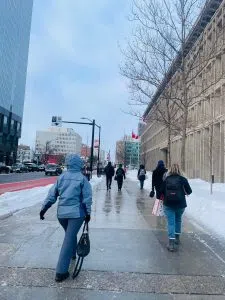
Pictures: Roger Farias
The Middlesex-London Health Unit issues cold weather alerts when temperatures drop to extreme lows. According to David Pavletic, Manager of Environmental Health at the Health Unit, an alert is triggered when temperatures reach “minus 15 degrees Celsius or minus 20 with the wind chill, or in situations where Environment and Climate Change Canada issues an alert.” He emphasized that these measures aim to raise public awareness and encourage precautions to protect against cold-related illnesses.
“With climate change, the way it is these days, it’s really difficult to anticipate what kind of weather patterns we’re going to experience,” said Pavletic. He added that the unpredictability of temperatures highlights the importance of preparedness. Key precautions include limiting time outdoors, dressing in warm layers, to prevent frostbite. For those in need, municipalities provide warming centres as temporary shelters.
Cold-related illnesses, such as frostbite and hypothermia, pose serious risks during extreme weather. Pavletic explained that frostbite can occur when skin is exposed to severe cold and strong winds for extended periods, while hypothermia results from a significant drop in core body temperature. To stay safe, he recommends monitoring weather forecasts, dressing appropriately, and planning for potential delays in outdoor activities. “It’s about being aware of the cold and taking steps to protect yourself,” Pavletic said, urging residents to prioritize their health and safety during winter’s harshest days.
 Adriana Aranguren, a Colombian who has lived in London since 2019, said the bodies of many people from tropical countries, where there are no seasons, often struggle to adapt to different types of viruses. “That’s why, in my family, we take steps during winter to prevent severe colds, like consuming vitamins through fruits and supplements and preparing remedies with lemon and honey to boost our immune system, especially on days like today with a low-temperature alert.”
Adriana Aranguren, a Colombian who has lived in London since 2019, said the bodies of many people from tropical countries, where there are no seasons, often struggle to adapt to different types of viruses. “That’s why, in my family, we take steps during winter to prevent severe colds, like consuming vitamins through fruits and supplements and preparing remedies with lemon and honey to boost our immune system, especially on days like today with a low-temperature alert.”
Naveen Babu, a registered nurse at the University Hospital, emphasizes the importance of maintaining healthy habits, particularly during flu season. Babu recommends six to seven hours of rest if possible. He also advises cleaning frequently touched surfaces, such as door knobs, and considers flu shots a valuable preventive measure. Limiting caffeine and alcohol intake is another suggestion, as excessive amounts can increase heart rate and deplete energy. A single morning coffee is acceptable, but Babu warned against consuming three or four cups a day, saying it’s not beneficial, regardless of the season.
Babu advises against wearing shorts or going shirtless during freezing temperatures, even though some people seem unaffected. “If that works for you, good, but don’t use them as an example for yourself,” he concluded.
The Middlesex-London Health Unit suggest to avoid strenuous exercise while out in the cold as much as possible and visit for more information about extreme cold: https://www.healthunit.com/extreme-cold




